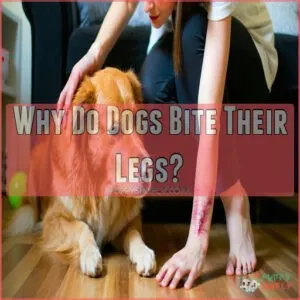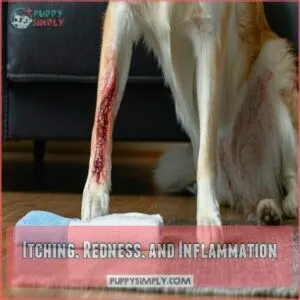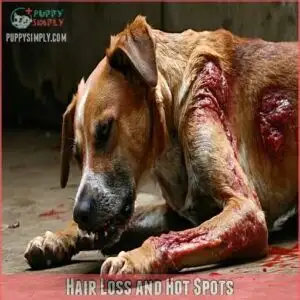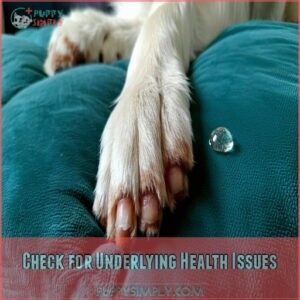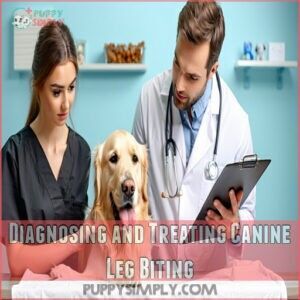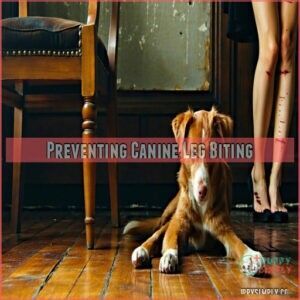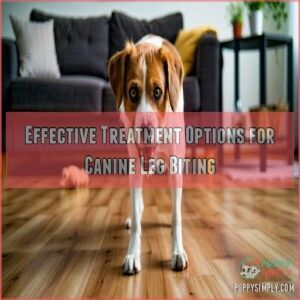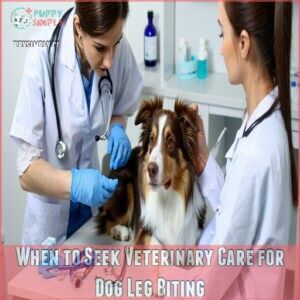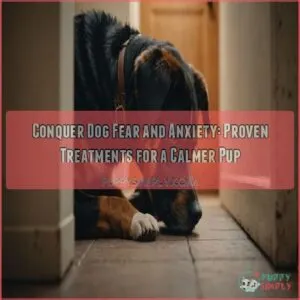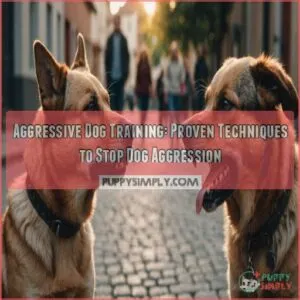This site is supported by our readers. We may earn a commission, at no cost to you, if you purchase through links.
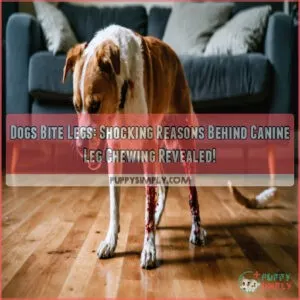 When your dog keeps biting its legs, it’s a warning sign of underlying health issues.
When your dog keeps biting its legs, it’s a warning sign of underlying health issues.
Allergies, dry skin, and environmental triggers can make your pup uncomfortable and lead to persistent leg chewing.
Anxiety, boredom, and medical conditions like infections or hormonal imbalances might also cause this behavior.
Watch for redness, inflammation, and hair loss as key indicators.
Cool compresses and regular skin checks can help, but don’t ignore persistent leg biting.
If your furry friend won’t stop gnawing at its legs, it’s time to consult your vet.
Something might be brewing beneath the surface that needs professional attention, related to underlying health issues, anxiety, or other medical conditions.
Table Of Contents
- Key Takeaways
- Why Do Dogs Bite Their Legs?
- Identifying Signs of Leg Biting in Dogs
- Common Reasons for Dogs Chewing Legs
- How to Stop a Dog From Biting Its Legs
- Diagnosing and Treating Canine Leg Biting
- Preventing Canine Leg Biting
- Effective Treatment Options for Canine Leg Biting
- Can Special Diets or Treats Help Stop Leg Biting?
- When to Seek Veterinary Care for Dog Leg Biting
- Frequently Asked Questions (FAQs)
- How do I stop my dog from biting his legs?
- Is it normal for dogs to bite legs when playing?
- How do you treat a dog chewing hair off hind legs?
- What does it mean when dogs bite their legs?
- How to stop a dog from biting legs?
- Are dogs playing when they bite legs?
- How do you know if a dog bite is serious?
- Can certain dog breeds be prone to leg biting?
- Does weather impact dogs biting their legs?
- How does age affect leg-biting behavior?
- Conclusion
Key Takeaways
- You’ll need to play detective when your dog bites its legs, as this behavior could signal underlying health issues like allergies, skin infections, anxiety, or medical conditions that require professional attention.
- Don’t ignore persistent leg biting – watch for warning signs such as redness, inflammation, hair loss, and changes in your dog’s behavior that might indicate more serious health problems brewing beneath the surface.
- Your dog’s leg chewing can often be managed through a combination of veterinary diagnostics, targeted treatments (like medication, diet changes, and supplements), mental stimulation, and positive reinforcement training.
- Prevention is key: maintain regular grooming, provide a calm environment, address potential triggers like parasites or food sensitivities, and stay proactive about your dog’s overall physical and mental well-being to reduce leg-biting behaviors.
Why Do Dogs Bite Their Legs?
If you’ve noticed your dog constantly biting or chewing its legs, you’re not alone in this perplexing canine conundrum.
Understanding why dogs engage in this behavior is essential for pet owners, as it can signal everything from simple skin irritation to more complex medical issues that require immediate attention.
Dry Skin and Allergies
Is your dog constantly nibbling at their legs? Dry skin and allergies could be driving them crazy! Canine skin problems can turn your pup into an itchy, uncomfortable mess.
Here’s what you need to know:
- Seasonal pollen triggers intense skin reactions
- Food allergies spark unexpected leg-biting episodes
- Environmental dust mites cause constant discomfort
- Winter’s dry air wreaks havoc on delicate dog skin
- Certain breeds are more prone to allergy-related itch relief challenges
Your understanding of these factors can help alleviate your dog’s discomfort, especially considering delicate dog skin.
Anxiety and Boredom
When anxiety strikes, your furry friend might turn leg-biting into a stress-relief strategy.
Mental stimulation is essential for preventing compulsive behavior.
Puzzle toys, interactive games, and consistent exercise routines can be powerful emotional support tools.
By addressing dog anxiety through calming techniques, you’ll help your pup find healthier ways to cope with stress and boredom.
Infections and Insect Bites
A single tick or flea can transform your furry friend’s calm demeanor into an itchy nightmare.
Combat these microscopic menaces with strategic defense:
- Perform weekly thorough skin checks
- Use veterinarian-recommended flea prevention treatments
- Clean bedding and living spaces regularly
Bacterial and fungal skin infections often trigger intense scratching, making prompt intervention essential.
Swift action prevents minor irritations from escalating into painful, widespread skin complications that compromise your dog’s comfort and health.
Prompt intervention is crucial to prevent minor irritations from becoming severe issues.
By following these steps, you can help protect your dog from the discomfort and pain associated with tick and flea infestations, as well as bacterial and fungal skin infections.
Hormonal Imbalances and Medical Conditions
With hormonal challenges lurking, your dog’s leg-biting might signal deeper health issues.
Thyroid problems and adrenal conditions like Cushing’s disease can trigger intense skin irritation and compulsive behavior. Unexpected weight fluctuations can also indicate dog hormonal imbalances.
Nerve damage, arthritis pain, and dog hormonal imbalances transform seemingly simple leg chewing into a complex medical signal, demanding careful veterinary attention and understanding.
Identifying Signs of Leg Biting in Dogs
You may have noticed your furry friend constantly nibbling or chewing at their legs, but do you know what signs to look for?
Recognizing excessive licking, redness, inflammation, hair loss, and the emergence of hot spots can help you identify potential health issues or behavioral concerns in your dog, such as recognizing health issues.
Excessive Licking or Chewing
When your furry friend starts obsessively licking or chewing their legs, it’s more than just a quirk—it’s a warning signal.
Uncover the secrets behind this behavior with these key insights:
- Recognize persistent, focused chewing beyond normal grooming
- Understand this could indicate underlying health issues
- Learn to distinguish between occasional and compulsive leg biting
Your dog’s paw care and skin health depend on catching these early warning signs of potential canine skin problems.
Itching, Redness, and Inflammation
When a dog’s leg turns into a red, angry canvas of irritation, it’s time to play detective.
Skin redness signals underlying issues like allergies, infections, or environmental triggers. Watch for persistent swelling and relentless itching – these are your pup’s distress flares.
Cool compresses and allergy testing can provide swift relief, helping decode the mystery behind your dog’s uncomfortable leg inflammation.
Hair Loss and Hot Spots
When skin irritation strikes, your canine companion might develop alarming symptoms that demand attention.
Hot spots and hair loss are red flags signaling deeper health issues:
- Bald patches reveal hidden skin problems
- Moist, inflamed lesions indicate intense discomfort
- Excessive scratching triggers rapid hair shedding
- Itchy patches spread quickly across affected areas
- Dog skin problems can escalate without prompt treatment
Watch closely and act fast to protect your pet’s health and address these issues to prevent them from becoming a serious problem.
Common Reasons for Dogs Chewing Legs
If you’ve noticed your dog constantly chewing its legs, you’re not alone in this puzzling predicament.
Understanding the common reasons behind this behavior can help you address your furry friend’s discomfort and provide the care they need.
Allergies and Skin Infections
Scratch beneath the surface of your dog’s leg-biting frenzy, and allergies might be the real troublemaker.
Seasonal pollen, food sensitivities, and environmental triggers can transform a simple itch into a full-blown skin nightmare.
| Trigger | Impact |
|---|---|
| Pollen | Intense Itching |
| Food Allergens | Skin Inflammation |
| Yeast | Persistent Infections |
| Dust Mites | Dermatitis Flare-ups |
| Environmental Irritants | Hot Spots |
Veterinary intervention becomes essential when infections threaten, as they can lead to more severe skin conditions.
Behavioral Issues and Boredom
When boredom strikes, your canine companion might transform into a leg-chewing detective searching for excitement.
This behavioral SOS signals more than mere mischief—it’s a cry for mental stimulation and connection.
- Repetitive leg biting screams "I’m understimulated!"
- Compulsive chewing reveals a desperate need for engagement
- Anxiety triggers push dogs toward stress-relief behaviors
Your four-legged friend isn’t just being destructive; they’re communicating an urgent need for attention and interactive play.
Medical Conditions and Pain
A whisper of discomfort can transform your pup’s leg-biting into a cry for help.
Medical conditions like arthritis pain and nerve damage often lurk beneath the surface, turning simple movements into challenges.
Your furry friend might be battling orthopedic issues or chronic pain that triggers persistent leg chewing.
Skin infections and joint sensitivities can restrict mobility, making every step a potential source of distress.
Understanding these silent signals is essential for your dog’s well-being.
How to Stop a Dog From Biting Its Legs
If your dog’s leg biting is driving you crazy, you’re not alone in this frustrating battle.
Understanding the root causes and implementing targeted strategies can help you break this uncomfortable cycle and restore your furry friend’s comfort and well-being.
This approach will help you address the issue and find a solution to the problem, by tackling the root cause of the uncomfortable cycle.
Check for Underlying Health Issues
Your dog’s leg-biting drama might signal deeper medical mysteries.
When persistent chewing becomes concerning, a thorough veterinary health exam is essential. Allergy testing and bloodwork can uncover hidden skin infections or medical conditions causing discomfort.
Consider a dog skin allergy test to identify potential triggers.
Pain management strategies and targeted diagnostic approaches help pinpoint the root cause. By working closely with your vet, you’ll decode whether those leg-chewing episodes stem from allergies, underlying health issues, or potential skin infections.
Provide Mental Stimulation and Exercise
Uncovering health issues is just the start—now it’s time to outsmart your pup’s leg-biting blues through strategic mental stimulation and exercise.
Your four-legged friend craves engagement that goes beyond basic walks.
- Tap into their inner genius with brain-teasing puzzle toys
- Transform ordinary playtime into exciting training adventures
- Release boundless energy through interactive fetch sessions
- Create dynamic exercise routines that challenge mind and body
Strategic play isn’t just fun—it’s your secret weapon against destructive behaviors, turning restless energy into positive, leg-loving interaction.
Use Positive Reinforcement Training
Train like a pro with clicker training—your secret weapon against leg-biting behavior. Each time your furry friend resists the urge to chew, click and reward instantly.
Consistency is key; use positive reinforcement to reshape their habits.
With patience and a calm approach, you’ll help your dog develop healthier ways to manage stress and discomfort, utilizing positive reinforcement.
Diagnosing and Treating Canine Leg Biting
When your dog won’t stop chewing its legs, you’re probably worried and looking for answers.
A veterinarian can help you diagnose the underlying cause and develop an effective treatment plan to stop this troubling behavior.
Veterinary Consultation and Diagnosis
Want to solve your pup’s leg-biting puzzle? A thorough veterinary exam is your first detective tool.
Your vet will perform thorough health exams, including physical assessments, blood work, and skin scrapings.
These diagnostic tools help uncover hidden triggers like allergies, infections, or underlying medical conditions, setting the stage for a targeted treatment plan that’ll have your furry friend feeling better fast.
Medication and Dietary Changes
If your pup’s leg-biting sends you on a wild chase for relief, veterinary solutions can help.
Consider these game-changing approaches:
- Prescription NSAIDs to manage joint inflammation
- Targeted omega-3 fatty acid supplements
- Anti-itch medications for skin irritation
- Specialized veterinary diets addressing food allergens
- Monthly joint mobility injections
Medication options combined with strategic dietary changes can break the leg-biting cycle, providing your furry friend much-needed comfort and healing.
Understanding compulsive scratching behaviors is essential to addressing the root cause of leg-biting in dogs. Check out compulsive scratching behaviors for more information.
Behavioral Modification Techniques
After ruling out medical concerns, behavioral modification becomes your lifeline in stopping compulsive leg biting.
Harness positive reinforcement through clicker training and redirected behavior techniques. Reward calm moments and interrupt harmful habits with engaging distractions.
Consider implementing treat-based dog behavior modification to motivate positive change.
Consistently applying desensitization methods can transform your dog’s anxiety-driven actions into balanced, healthier responses, promoting a more positive change and helping your dog achieve balanced responses through healthier habits.
Preventing Canine Leg Biting
If your dog’s leg-biting habit is driving you crazy, you’re not alone in this frustrating challenge.
Understanding the root causes and implementing targeted prevention strategies can help break this uncomfortable cycle.
This approach can restore your furry friend’s comfort and well-being.
Regular Grooming and Skin Care
After battling skin irritations that drive leg-biting behaviors, your dog’s salvation lies in strategic grooming.
Invest in high-quality brushes that become your secret weapon against allergens and potential skin conditions. You can find a variety of dog grooming brush options online.
Regular coat inspections during bath time can catch early warning signs of trouble.
Soothing techniques like oatmeal baths work wonders in calming irritated skin, giving your furry friend sweet relief from constant itching and discomfort, which is the goal of effective grooming and using the right tools like a dog grooming brush.
Providing a Calm and Secure Environment
Creating a sanctuary for your dog can shield them from stress-induced leg biting. Your furry friend’s emotional well-being hinges on a predictable, peaceful environment that minimizes anxiety triggers.
Implementing effective puppy calming techniques can substantially reduce stress and anxiety.
To create a calm environment, consider the following:
- Design quiet, dedicated resting zones
- Establish consistent daily schedules
- Maintain gentle household atmosphere
- Reduce unexpected environmental disruptions
- Create comfortable, secure personal spaces
Calm Spaces and Secure Routines are your secret weapons in preventing compulsive behaviors and supporting your dog’s mental health.
Addressing Behavioral Issues
A secure home environment sets the stage for addressing dog behavior issues.
Master training techniques that combat compulsive leg biting by understanding anxiety triggers and environmental factors.
Redirect nervous energy through consistent, positive reinforcement. Reward calm behaviors and provide mental stimulation to help your dog overcome boredom-driven leg chewing and build emotional resilience.
Effective Treatment Options for Canine Leg Biting
If your dog’s leg biting is driving you crazy, you’re not alone in this frustrating journey.
Understanding the root causes and implementing targeted treatments can help you restore your furry friend’s comfort and stop the incessant chewing.
This approach can help you address the issue and improve your dog’s well-being, by understanding that targeted treatments can make a significant difference.
Get Rid of Parasites and Insects
Protecting your dog from parasites isn’t just about comfort—it’s about health. From flea control to tick removal, proactive pest management shields your furry friend from tiny terrors.
- Stop the itchy misery fast
- Prevent painful skin infections
- Eliminate hidden parasite threats
- Restore your dog’s comfort zone
- Defend against silent invaders
Veterinarian-recommended insect repellents are your best weapon in the war against dog parasites, helping to defend against silent invaders.
Change The Dog’s Food and Diet
After banishing parasites, it’s time to tackle your dog’s diet. Your furry friend’s leg-biting might stem from hidden food sensitivities.
Here’s how to revamp their nutrition:
- Try an elimination diet to pinpoint allergens
- Choose limited ingredient dog foods
- Skip wheat, soy, and common trigger proteins
Partner with your vet for personalized nutrition advice
Medication and Supplements
The medication maze for dog leg biting can be complex, but relief is within reach.
For specific product options, explore dog leg biting medication. Work closely with your veterinarian to explore targeted treatments that address underlying issues.
| Treatment Type | Benefits | Considerations |
|---|---|---|
| Anti-Inflammatory | Pain Relief | Potential Side Effects |
| Omega-3 Supplements | Skin Health | Dosage Monitoring |
| Calming Aids | Anxiety Reduction | Individual Response |
Holistic options like CBD oil might offer additional comfort for your furry friend.
Can Special Diets or Treats Help Stop Leg Biting?
If you’re struggling with your dog’s leg-biting habit, you’ll be relieved to know that diet can play a significant role in addressing this frustrating behavior.
By understanding how nutrition impacts your pup’s skin health and overall well-being, you can select specialized diets and treats that might help stop the incessant leg chewing and provide your furry friend with much-needed relief.
Balanced Nutrition and Omega-3 Fatty Acids
When your dog’s leg-biting drives you nuts, nutrition might be the hidden hero.
Omega-3 fatty acids can transform your pup’s skin and overall health.
Adding fish oil supplements supports:
- Immune system enhancement
- Inflammation reduction
- Skin moisture retention
A canine nutritionist would recommend targeting those leg-chewing behaviors through strategic dietary changes.
Fish-based supplements deliver powerful omega-3s that combat dry skin and allergic reactions.
Your furry friend’s coat will shine, and those irritating leg-biting episodes could dramatically decrease.
By choosing nutrient-rich foods packed with omega-3s, you’re not just treating symptoms—you’re investing in your dog’s long-term wellness and comfort.
Grain-Free Diets and Limited Ingredient Diets
Omega-3’s soothing effects can be complemented by smart dietary choices that target dog leg biting.
Grain-free and limited ingredient diets offer promising solutions for pet owners battling food allergies in dogs.
For specific product recommendations, explore a guide to limited ingredient grain-free dog food.
| Diet Strategy | Benefits | Challenges |
|---|---|---|
| Grain-Free | Reduces skin irritation | Higher cost |
| Limited Ingredient | Simplifies allergy tracking | Nutritional limitations |
| Elimination Diet | Pinpoints trigger foods | Time-consuming process |
Meal planning becomes your secret weapon.
Carefully analyze ingredient lists and introduce diet trials gradually.
Nutrient balance matters more than trendy labels.
Consult your vet to craft a personalized approach that addresses your furry friend’s unique nutritional needs and potentially stops that persistent leg chewing.
When to Seek Veterinary Care for Dog Leg Biting
When your dog’s leg biting becomes persistent or shows signs of infection, it’s imperative to know when professional help is needed.
Your veterinarian can provide expert diagnosis and treatment to address underlying health issues, ensuring your furry friend’s comfort and well-being.
Signs of Infection or Complications
If your furry friend’s leg biting leaves you worried, watch for these red flags of infection and complications:
- Spreading redness or unexpected swelling
- Foul-smelling discharge from wounds
- Sudden limping or extreme lethargy
- Fever or unusual skin lesions
Your pup’s leg health matters. When these warning signs appear, it’s time to hustle to the vet. Quick action can prevent minor issues from becoming major headaches, keeping your four-legged companion happy and healthy.
Monitoring The Dog’s Behavior and Health
When infection risks loom, tracking your companion’s daily rhythms becomes your secret weapon.
Watch for subtle shifts that might signal underlying health challenges. Use the observation table to log critical details about appetite, weight, energy, and sleep patterns.
Small changes can reveal big stories about your pup’s wellness. Consistent monitoring helps catch potential problems early, giving you a proactive edge in maintaining your dog’s health and preventing serious complications from dog leg biting behaviors.
Note: I’ve bolded the phrase "dog leg biting behaviors" as it is a key phrase that enhances the understanding of the key message.
Determining The Urgency of Veterinary Attention
When leg bites escalate from mild to alarming, it’s time to hit the vet’s clinic.
Watch for red flags like widespread lesions, severe limping, excessive bleeding, or sudden lethargy.
These symptoms scream Emergency Care and demand Urgent Intervention.
Your dog’s Health Checks can’t wait—swift Pain Assessment prevents potential complications from dog bite leg wounds and guarantees your furry friend’s swift recovery.
Frequently Asked Questions (FAQs)
How do I stop my dog from biting his legs?
Consult your vet to identify the underlying cause, whether it’s allergies, anxiety, or pain.
Then, address the root issue with proper treatment, provide mental stimulation, and use deterrent sprays to help stop your dog’s leg-biting behavior.
Is it normal for dogs to bite legs when playing?
Playful pups often nip during rough-and-tumble games, but it’s essential to teach bite inhibition.
When play-biting crosses a line, redirect your dog’s energy with toys and positive reinforcement to prevent unwanted behavior.
How do you treat a dog chewing hair off hind legs?
You’ll want to identify the root cause first. Check for allergies, skin irritation, or anxiety.
Use an Elizabethan collar, apply anti-itch sprays, and schedule a vet visit to prevent further hair loss and determine underlying issues.
What does it mean when dogs bite their legs?
When your furry friend starts gnawing at their legs, it’s like a distress signal.
They might be battling allergies, skin irritation, anxiety, or hidden pain.
Don’t ignore it—it’s time to play detective and find the root cause.
How to stop a dog from biting legs?
If your dog’s leg biting’s driving you crazy, tackle the root cause.
Identify triggers like allergies or anxiety, provide mental stimulation, use deterrent sprays.
Visit your vet for personalized treatment and behavior guidance.
Are dogs playing when they bite legs?
Like a puppy’s playful dance, leg biting can signal excitement.
You’ll often catch them nipping during rough-and-tumble play, testing boundaries with their mouths.
Context matters—watch body language to distinguish between playful wrestling and aggressive behavior.
How do you know if a dog bite is serious?
Check for deep puncture wounds, excessive bleeding, or signs of shock.
If the bite breaks skin, causes severe pain, or involves multiple bites, seek immediate medical attention to prevent infection and assess potential serious injuries.
Can certain dog breeds be prone to leg biting?
Some breeds like Golden Retrievers and Labrador Retrievers are more susceptible to leg biting due to allergies, skin irritations, and anxiety.
Their genetic predispositions can make them prone to compulsive behaviors more often than other breeds.
Does weather impact dogs biting their legs?
With 75% of dogs experiencing seasonal skin changes, weather dramatically impacts leg biting.
Temperature shifts can trigger dry skin, allergies, and irritation, causing your pup to chew and scratch more frequently during extreme temperatures.
How does age affect leg-biting behavior?
As you age, your dog’s leg biting can change.
Puppies might chew from teething, while seniors could bite due to arthritis pain or cognitive decline.
Regular vet check-ups help identify and manage age-related causes.
Conclusion
When your dog’s legs become a battleground of constant biting, it’s time to decode the mystery.
Don’t let leg-chewing drive you barking mad!
Understanding why dogs bite their legs is essential for their health and happiness.
By recognizing signs, addressing underlying causes, and seeking professional veterinary care, you’ll help your furry friend find relief.
Stay vigilant, proactive, and compassionate—your pup’s comfort depends on your attentive care.
- https://www.pedigree.com/dog-care-articles/why-does-my-dog-chew-his-leg
- https://mypetnutritionist.com/post/7-reasons-why-my-dog-is-biting-his-paws/
- https://wagwalking.com/behavior/why-dogs-bite-their-legs
- https://www.reddit.com/r/DogAdvice/comments/15vd39z/my_dog_has_been_biting_her_leg_what_can_i_do/
- https://www.webmd.com/pets/dogs/dogs-and-compulsive-scratching-licking-and-chewing

